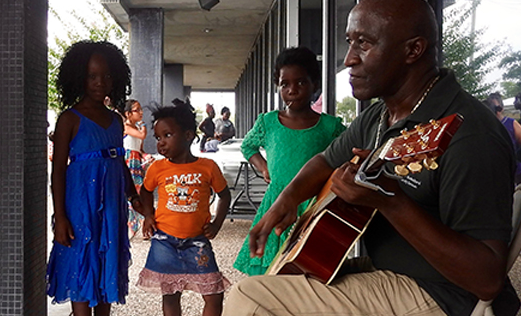The bulletin board in the lobby of the Alliance for Multicultural Community Services in southwest Houston is covered in fliers for English language classes, employment and training opportunities and programming for kids. In addition to serving the city's large community of recent immigrants, the Alliance is one of five resettlement agencies in the Houston area that help refugees make a home here.
But lately, the agencies have been scrambling, first after the executive order that stopped all refugees from entering the country, then again after a court order reversed the ban, which also targeted immigration from seven majority-Muslim countries.
Now, a review from the 9th Circuit Court of Appeals has upheld the temporary injunction but the course from here is far from certain. And with a ticking clock and their funding in jeopardy, the agencies are hurrying to welcome the families shut out after the initial executive order.
An Iraqi family of 10 planning to come to Houston was one of the roughly 90,000 visa holders from the seven countries affected by President Donald Trump's order. An aid worker describes their ordeal. The father worked as an interpreter for U.S. forces. Catholic Charities of the Archdiocese of Galveston-Houston made preparations for their arrival, which included the logistics of getting an apartment, groceries and furniture. But the executive order threw those plans into chaos.
Then, a Seattle federal judge issued a temporary injunction suspending the ban, paving the way for the arrival after all. The family was immediately on the phone with Catholic Charities. They booked the plane tickets, and Tuesday night, they arrived in Houston. As of Wednesday, Catholic Charities had eight more families set to arrive from across the world, including Rwanda, Somalia, Iraq and Nepal. But those trips will only last so long as the injunction is in effect.
With the injunction upheld, Vox explains, "the federal government will have to keep allowing visa holders from seven majority-Muslim countries, as well as refugees, to enter the United States — at least until it can get a favorable court ruling (either on appeal or a second ruling from the judge that initially put the ban on hold) in a case where it’s now 0-for-2."
For Wafa Abdin, vice president for immigration legal services with the Cabrini Center of Immigrant Legal Assistance at Catholic Charities, that means, "we are working hour to hour," she said. "We don't know how long this will continue of course."
The stories are similar across the Houston-area agencies. As of Wednesday morning, Refugee Services of Texas expected two families to arrive this week -- one from Afghanistan, the other from the Democratic Republic of Congo. Interfaith Ministries for Greater Houston expected 14 refugees. Partnerships with apartment complexes make housing families on short notice possible.
But amid the rush to get families safely in the country, the agencies also have the uncertainty of their funding, which is based on the number of new refugees they serve each year.
"We expected to have another 200 people or so in the next 120 days," said Sara Kauffman, the Houston director of Refugee Services of Texas. Thursday's ruling upholding the injunction importantly did not rule on the merits of the ban itself. If the ban is ultimately upheld, and refugees are once again barred, that means no new funding for resettlement agencies, in addition to the hardships their clients would face. Even if the ban is not upheld and stricter caps are put in place instead, limiting the number of refugees accepted, that could also create financial pressure for the resettlement agencies.
While most of the allotted funding goes toward housing and supplies for the families entering the country, it also helps pay for her staff of case managers and workers who help refugees well after the initial window of resettlement, through a variety of programs that help refugees become self sufficient. She estimates each of her case managers works with about 70 individuals at any given time on everything from job searches to health issues.
"It's already an underfunded program," said Kauffman, "so if you cut it at all, it's hard for the programs to continue."
Agencies in Texas have also had to adjust after the state decided to pull out of the federally-funded refugee resettlement program, a change that took effect February. Though the federally funded program was not altered, the state no longer serves as its administrator, coordinating funds with local groups. "After four decades of working with the state to have them withdraw was kind of hard," said Kauffman. Now, a group of nonprofits will serve as the administrator for the program.
With refugee families arriving now every day, there is a lingering uncertainty for them as well. "This continuous fear,"explained Abdin, that has refugees asking themselves; "'Is this the welcoming country we expected?'" And many refugees who have been here for years are now afraid to leave the country. "I’m afraid to leave the U.S. now," one refugee from Iran who's been living in Houston for six years told Kinder Institute Fellow and filmmaker Yehuda Sharim after the executive order was first issued.
Members of Abdin's staff, many of whom are refugees themselves, are asking themselves the same sorts of questions, she said. But refugees bring with them resiliency, she said. "They bring it here and teach us."
And so the work continues.
"We are of course hoping for the best and will continue serving our clients in the capacity we are able to," wrote Selene Escaper, community relations director with the Alliance, in an e-mail.
But depending on the next court ruling, families could again be shut out, and agencies could lose significant funding. "If this ban continues, we definitely need help with the funding, whether it's from the city or individuals in order to sustain the program," said Abdin.


